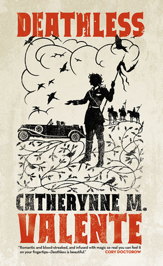“Deathless” by Catherynne M. Valente

“This is Russia and it is 1952. What else would you call hell?”
The retold fairytale is an old and well-worn road in the fantasy genre. Deathless by Catherynne M. Valente, still manages to arrive with something new. Valente hasn’t just taken “The Death of Koschei the Deathless” into modern Russia. She has also made a fairytale — a dark, and brutal, and frightening tale — out of the Russian revolution and the siege of Leningrad.
Marya Morevna is not the hero of “The Death of Koschei the Deathless.” Deathless is her story. She begins as a young girl in Saint Petersburg, watching as birds arrive, one by one, transform into men, and marry her sisters. By the time Koschei comes for her, she is a young woman in Leningrad.
Koschei is a perennial villain from Russian mythology. In Deathless he is cast as the Tsar of Life, fighting an endless war with the Tsar of Death that is always going badly. Marya steps into this mess and, right from the beginning, refuses to be what the fairytale demands that she be. She refuses to betray Koschei, her husband. She refuses to be helpless. And she swears that she will not go with Ivan when he arrives.
Because the hero of the story is Ivan — the hero of the story must always be an Ivan, who rescues the beautiful bride from Koschei’s withered hands. One of the central themes of Deathless is that everyone in the book knows how the story is supposed to end. They can choose to fight it, if they want. Marya does.
That sort of self-awareness will probably put some people off of Deathless. Like a lot of her writing, this book is aware that it is a book. Valente is not afraid to let her narrator turn and address the audience directly. I think this works in the context of a story whose roots lie in an oral tradition.
The fairytale style also helped give me some much-needed emotional distance from the worst of the brutality in Leningrad. Valente juxtaposes terrifying myths, such as the witch Baba Yaga who grinds the bones of disobedient girls in her flying mortar, with real tragedies — like people putting the bodies of their loved ones on sleds to take to the graveyard, only to die on the way, nameless and alone in the Russian winter.
The writing in Deathless is beautiful. I adore Valente’s writing style, and this book did not let me down. Readers who enjoyed her short story collection, Ventriloquism, will certainly find something to love in Deathless. They may recognize a character who first appeared in one of Valente’s short stories, and who has a minor role to play here.
Deathless is a subtle book. I was charmed by Naganya the rifle imp, and I’m sure there are many similar puns to be found elsewhere. The more the reader knows about Russia, its language, history, and mythology, the more they will get out of this book. Fans of Valente should definitely pick this one up, as should anyone who enjoys a dark fairytale well told.


